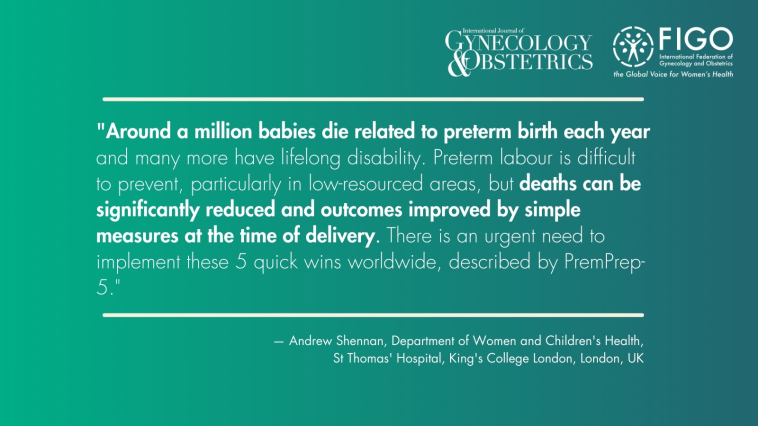New IJGO publication: “Effective and simple interventions to improve outcomes for preterm infants worldwide: The FIGO PremPrep-5 initiative”

FIGO and IJGO are pleased to announce the publication of the “Effective and simple interventions to improve outcomes for preterm infants worldwide: The FIGO PremPrep-5 initiative”.
This paper was written by the FIGO Preterm Birth Committee, 2021–2023 and published in January 2024.
This paper unveils the FIGO PremPrep-5 initiative which aims to disseminate fundamental information on the most simple and effective interventions to implement across the globe in order to improve neonatal outcomes worldwide.
Preterm birth remains the major cause of mortality among under-5 year-olds worldwide.
Preterm birth continues to be the biggest contributor to neonatal and infant death and can increase the risk of short-term and longer-term complications. Demographical disparities also play a part in this, with 80% of preterm births occurring in low- and middle-income countries, where neonatal and follow-up care is not as readily available as it is in higher-income countries.
It can be difficult to bridge the gap between these discrepancies, which is why FIGO has produced these simple, effective and low-cost interventions that are more easily implemented in most settings and can lead to significant improvements in neonatal outcomes.
Five basic interventions to improve neonatal outcomes
FIGO recognises that while increasingly complex perinatal interventions have improved overall survival in high-resource settings, there is a need for easily accessible and effective interventions that can be carried out across the globe. In this paper, five such interventions are indicated as the basis of care of women in preterm labour and newborn preterm infants.
Here are the key takeaways of this paper:
- Two of the five proposed interventions (antenatal corticosteroids and magnesium sulphate) rely on access to inexpensive, heat-stable medications that can be administered intramuscularly.
- The remaining three interventions (delayed cord clamping, breast milk, and kangaroo care) can be implemented with minimal resources, without the need for drugs or additional medical equipment.
- When used together, these five perinatal interventions can help to reduce perinatal complications and they can be easily adopted into most settings.
Read the “Effective and simple interventions to improve outcomes for preterm infants worldwide: The FIGO PremPrep-5 initiative” here.